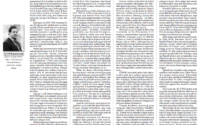Thariqus Shalihin – The Believing Sinner Can Enter Jannah?
The Believing Sinner Can Enter Jannah?
Translated from: Thariqus Shaliheen by Ust. Anshari Taslim (may Allah preserve him), Chapter I: Iman and Aqeedah
Translator: Fajri Matahati Muhammadin
There are people around us who seem to never miss their shalat, but seem to never miss the opportunity to transgress Allah’s limits. Or, even worse, there are those who are Muslims (seemingly just by name) but they spend every second of their life to sin and violate Allah’s laws. It is as if sins are their intimate friends until the moment they die. Can people like this enter jannah?
It is a belief of the ahlus sunnah wal jama’ah that a Muslim who commits a grave sin is within Allah’s Will. He will forgive it if He Wills it, or if not then the person will be put into hellfire. Even for these kinds of people who enter hellfire, they wont stay there forever. They will be tortured proportional with the amount of sin they have committed. The more they have sinned, the longer they will spend in hellfire.
After spending their time in hellfire and burning off their sins, they will be taken out from hell and put into jannah because they still –at least—have a spot of imaan in their hearts. This is the proper way to understand the hadeeth narrated by Abu Sa’id al-Khudri r.a., where Rasulullah s.a.w. said:
يُدْخِلُ اللَّهُ أَهْلَ الْجَنَّةِ الْجَنَّةَ يُدْخِلُ مَنْ يَشَاءُ بِرَحْمَتَهِ وَيُدْخِلُ أَهْلَ النَّارِ النَّارَ ثُمَّ يَقُولُ انْظُرُوا مَنْ وَجَدْتُمْ فِي قَلْبِهِ مِثْقَالَ حَبَّةٍ مِنْ خَرْدَلٍ مِنْ إِيمَانٍ فَأَخْرِجُوهُ . فَيُخْرَجُونَ مِنْهَا حُمَمًا قَدِ امْتَحَشُوا . فَيُلْقَوْنَ فِي نَهْرِ الْحَيَاةِ أَوِ الْحَيَا فَيَنْبُتُونَ فِيهِ كَمَا تَنْبُتُ الْحِبَّةُ إِلَى جَانِبِ السَّيْلِ أَلَمْ تَرَوْهَا كَيْفَ تَخْرُجُ صَفْرَاءَ مُلْتَوِيَةً
“Allah will admit into Paradise those deserving of Paradise, and He will admit whom He wishes out of His Mercy, and admit those condemned to Hell into the Fire (of Hell). He would then say: See, he whom you find having as much faith in his heart as a grain of mustard, bring him out. They will then be brought out burned and turned to charcoal, and would be cast into the river of life, and they would sprout aj does a seed in the silt carried away by flood. Have you not seen that it comes out yellow (fresh) and intertwined?” (Sahih Al-Muslim, Hadeeth No. 184)
This hadeeth divides the people of jannah into three categories:
- Believers (Muslims) with good deeds outweighing their bad ones, or those who have never sinned like a person who died as a child.
- A person who enter jannat not because of their good but merely by Allah’s Mercy. This person should have went to hellfire, since his sins outweighs his good deeds. However, there may be very special circumstances that brought Allah’s Rahmat upon him so that he ended up in Jannah The Sahihayn narrated a story that may serve as an example, where a person died with no good deeds and on his deathbed requested that his body is burnt so that Allah cannot find him because he was afraid to go to hell.
- Believers (Muslims) with sins outweighing his good deeds, so he will have to enter hellfire if he did not get Allah’s forgiveness. However, this will not be forever. When he has served his time and burned off his sins, he will be taken out of hell and inserted into heaven, as long as he died as a Muslim.
Certainly we cannot compare these people (translator: the second and third class) to those who enter jannah directly without ‘paying a visit to hell’. Some authentic narrations mention that such people (translator: that second and third class people) will merely live in the ‘slums’ of jannah which is ten times better than the world and all its contents. Such is the fate of the lowest class in jannah, with a worldly equivalent to it might be the most ragged house you can imagine to find in the worst ghetto. However, the poorest man in jannah will think that there is no creature receiving greater pleasure from Allah than him, because that is just how much pleasure and satisfaction he gets in ‘slum’ of jannah.
Mughirah bin Shu’bah Narrated in Sahih Muslim, Hadeeth No. 189, that Rasulullah s.a.w. said:
Musa a.s. asked his Lord: Who amongst the inhabitants of Paradise is the lowest to rank?
He (Allah) said: The person who would be admitted into Paradise last of all among those deserving of Paradise who are admitted to it. I would be said to him: Enter Paradise. He would say: O my Lord! how (should I enter) while the people have settled in their apartments and taken the shares (portions)? It would be said to him: Would you be pleased if there be for you like the kingdom of a king amongst the kings of the world? He would say: I am pleased my Lord.
He (Allah) would say: For you is that, and like that, and like that, and like that, and that.
He would say at the fifth (point): I am well pleased. My Lord.
He (Allah) would say: It is for you and, ten times like it, and for you is what your self desires and your eye enjoys.
He would say: I am well pleased, my Lord.
He (Musa a.s.) said: (Which is) the highest of their (inhabitants of Paradise) ranks?
He (Allah) said: They are those whom I choose. I establish their honour with My own hand and then set a seal over it (and they would be blessed with Bounties) which no eye has seen, no ear has heard and no human mind has perceived.
So if the lowest ‘slum’ at the ‘ghettos’ of jannah is greater than ten times of the world and its contents as we know it, then the wealth owned by Bill Gates, Carlos Slim, Amancio Ortega etc[1] worth nothing. Even our wildest imagination cannot imagine the riches and luxury of that poorest man in jannah.
*****
[1] The richest people in the world in 2015 according to FORBES
———————————————–
Notes From the Translator
General Notes:
Probably I shall just repeat the general note in the previous Thariqus Shalihin translation:
Translations for texts of hadeeth and Qur’an are taken from credible English translations (M. Marmaduke Pickthall for the Qur’an, and www.sunnah.com for hadeeth from the as-Sittah).
The other notes I make below (and for future translations of Thariqus Shalihin) is not intended to be some sort of academic commentary, as I am no scholar and definitely not in the position to make such commentary. However, these are just some thoughts that came to my mind when reading the text so I just thought I should share them (since its my blog anyway)
A physical copy of this book (in Bahasa Indonesia) can be purchased for Rp. 80.000,- (excluding delivery costs). Kindly contact Ust. Anshari Taslim directly through his facebook account to place your order.
Note 1:
One may ask, how is it possible that a person does shalat but still commits sins? Did Allah not say:
إِنَّ ٱلصَّلَوٰةَ تَنۡهَىٰ عَنِ ٱلۡفَحۡشَآءِ وَٱلۡمُنكَرِۗ وَلَذِكۡرُ ٱللَّهِ أَڪۡبَرُۗ
“Lo! worship preserveth from lewdness and iniquity” (Surah Al Ankabut ayat 45)
Remember that shalaat is much more than a mere act of jumping up and down and reciting (what may seem to be for the person to be) meaningless words. There is a great difference between shalaat done merely as an act of body and verbal gymnastics and one conducted while putting one’s heart and mind into this beautiful communication with Allah. The correct understanding of this ayat is the second kind of shalat that will guard us from ill-behavior.
For further explanation on this, kindly check this fatwa which is available only in Bahasa Indonesia and Arabic.
Note 2:
Please do not misunderstand this beautiful passage. It is certainly not his or anyone’s intention to suggest that it is therefore fine for you to keep on committing sins just because ‘meh, Im going to jannah anyway at some point.’
I really wish to draw your attention towards the fact that its not just ‘you will end up in jannah anyway‘ that you should pay attention to. Rather, it is most important to consider the requirement to end up in jannah : having at least some Imaan. How can you be really sure that you have even the smallest amount of imaan, if everything you do are acts of disbelief or kufr? Allah says in Surah An-Nuur ayat 51:
إِنَّمَا كَانَ قَوۡلَ ٱلۡمُؤۡمِنِينَ إِذَا دُعُوٓاْ إِلَى ٱللَّهِ وَرَسُولِهِۦ لِيَحۡكُمَ بَيۡنَهُمۡ أَن يَقُولُواْ سَمِعۡنَا وَأَطَعۡنَاۚ وَأُوْلَـٰٓٮِٕكَ هُمُ ٱلۡمُفۡلِحُونَ
“The saying of (all true) believers when they are called unto Allah and His messenger to judge between them is only that they say: We hear and we obey. And such are the successful.”
What do we call someone that, in context of the above ayat, respond ‘I hear but no thanks’?
Dont forget what hellfire can bring. I mean, if you cant stand not committing zina (or other sins, grave or small) then what makes you think you can go through hellfire?
So you need to put things into a good balanced perspective. On one hand, you should never lose hope from Allah’s forgiveness. He forgives all sins (even Shirk, as long as you repent from it before you die). It was narrated by Abdurrazaq and Ath-Thabarani that an honorable companion of Rasulullah s.a.w. Abdullah ibn Mas’uud r.a. mentions that one of the biggest sins to despair and lose hope in Allah’s mercy and forgiveness. But on the other hand, you should not abuse the situation because you do not know on what circumstance will you die on.
Just, please, dont underestimate these situations. It is worth noting what Imam Hasan al-Basri r.a. says about the act of hypocrisy: “No one fears it but a believer, and no one feels safe from it but a hypocrite”
Note 3:
The hadeeth about the man who wished for his body to be burnt was only mentioned in passing, but I think you should know the full text. It was reported by Abu Hurayrah r.a. that Rasulullah s.a.w. said:
كَانَ رَجُلٌ يُسْرِفُ عَلَى نَفْسِهِ، فَلَمَّا حَضَرَهُ الْمَوْتُ قَالَ لِبَنِيهِ إِذَا أَنَا مُتُّ فَأَحْرِقُونِي ثُمَّ اطْحَنُونِي ثُمَّ ذَرُّونِي فِي الرِّيحِ، فَوَاللَّهِ لَئِنْ قَدَرَ عَلَىَّ رَبِّي لَيُعَذِّبَنِّي عَذَابًا مَا عَذَّبَهُ أَحَدًا. فَلَمَّا مَاتَ فُعِلَ بِهِ ذَلِكَ، فَأَمَرَ اللَّهُ الأَرْضَ، فَقَالَ اجْمَعِي مَا فِيكِ مِنْهُ. فَفَعَلَتْ فَإِذَا هُوَ قَائِمٌ، فَقَالَ مَا حَمَلَكَ عَلَى مَا صَنَعْتَ قَالَ يَا رَبِّ، خَشْيَتُكَ. فَغَفَرَ لَهُ
“A man used to do sinful deeds, and when death came to him, he said to his sons, ‘After my death, burn me and then crush me, and scatter the powder in the air, for by Allah, if Allah has control over me, He will give me such a punishment as He has never given to anyone else.’ When he died, his sons did accordingly. Allah ordered the earth saying, ‘Collect what you hold of his particles.’ It did so, and behold! There he was (the man) standing. Allah asked (him), ‘What made you do what you did?’ He replied, ‘O my Lord! I was afraid of You.’ So Allah forgave him. ” Another narrator said “The man said, Fear of You, O Lord!” (Sahih Bukhari, Hadeeth No. 3481 and Sahih al-Muslim, Hadeeth No. 2756)
Fearing Allah is a part of Imaan, and it will be explained further inshaaAllah in the next Thariqus Shalihin translation.
OTHER PARTS OF THARIQUS SHALIHIN
Chapter I : Imaan and Aqeedah
1. Iman and Islam: The Main Road to Jannah
2. The Believing Sinner can Enter Jannah?
3. Entering Heaven By Fearing Allah (Part 1), (Part 2), (Part 3), (Part 4), (Part 5), (Part 6)


